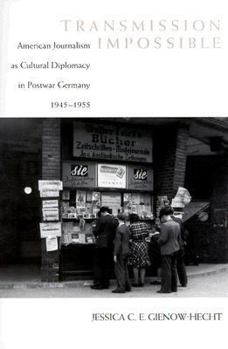Transmission Impossible: American Journalism as Cultural Diplomacy in Postwar Germany, 1945--1955
(Part of the Eisenhower Center Studies on War and Peace Series)
In this innovative study, Jessica C. E. Gienow-Hecht challenges long-standing analyses of the United States' "cultural imperialism" that emphasize the policy makers' determination to export U.S. culture in order to spread capitalism and gain access to overseas markets and raw materials. She also contests the claims by scholars of reception theory that foreign audiences deliberately condition the reception of U.S. culture abroad. Studying the example of the U.S. Army newspaper the Neue Zeitung--published for the German population from 1945 to 1955--she convincingly demonstrates that U.S. officials actually exerted very little direct influence on their cultural and information programs in postwar Germany, leaving the initiative to binational midlevel agents. Transmission Impossible reveals that the selection of agents who transmit political and cultural values to the foreign world is as crucial to the success of the enterprise as the package of values itself.
The Neue Zeitung was run by German--speaking migr s, mostly of Jewish descent, who had fled the Third Reich in the 1930s and whose political history ranged from communism to fascism. Children of Weimar Kultur, but beneficiaries of Franklin D. Roosevelt's New Deal, these men and women possessed a unique understanding of how to present the American way of life to a German audience. They intertwined European concepts of culture and gender with U.S. politics, showing that democracy was reflected in values of high culture, such as artistic freedom, creativity, individualism, and tolerance. In the dawning Cold War, the paper's large circulation--extending even into the Soviet occupation zone--indicated the success of its approach and the editors' lasting political and cultural influence in postwar Germany.
In retracing the history of the Neue Zeitung, Gienow-Hecht focuses on the editors' biographies and their conflicts with the U.S. War Department, charting the newspaper's political and philosophical changes over the course of a decade. She examines the publication's role in the larger context of occupation policy and psychological warfare, its significance in the unfolding Cold War, the growing Soviet resentment of the paper, the attempted shift of the Neue Zeitung from an information medium to a propaganda instrument, public and official reactions to this change of editorial policy, and the unsuccessful effort of U.S. officials to turn the paper into a mouthpiece of the U.S. military in Germany shortly before the ratification of the German Basic Law.
Transmission Impossible addresses many lingering questions regarding the transmission of culture and the influence of images, core values, and ideas on a country's foreign relations. Containing a wealth of fresh information on the use of propaganda in the Cold War, the administrative structure of the U.S. occupation, Soviet-American conflicts, and Jewish biography, this book will be of interest to scholars of U.S. foreign relations, German history, occupation history, ethnicity, sociology, and culture. More than the history of one newspaper, Gienow-Hecht's groundbreaking work revolutionizes our understanding of how culture instruments and cultural agents become important arbiters of political power.





